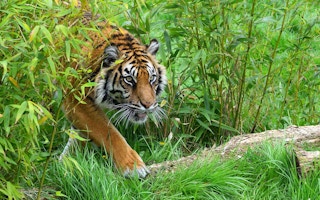Wildlife experts have called on the Indonesian government to boost protection of critically endangered tigers in the vicinity of a major road project in Sumatra, following a recent sighting of one of the big cats by construction workers.
A photo of the Sumatran tiger (Panthera tigris sondaica) standing on a steep embankment next to the toll road in Riau province was widely shared on the messaging application WhatsApp from Feb. 16. While it’s unclear who took the photo and when, officials confirmed that the tiger was seen along one of the six sections of the province’s Pekanbaru-Dumai highway. The government says it expects the road to be fully open to traffic in May.
Heru Sutmantoro, a sectional head of the provincial conservation agency, or BKSDA, said there were indeed some small tiger populations known to occur near that site, in the Tapung-Petapahan forest park, so the animal’s appearance wasn’t unexpected. “It’s a common thing, nothing strange,” he said.
He said there was also a facility nearby to train elephants used in forest monitoring programs. As such, Heru said, there are also hundreds of Sumatran elephants (Elephas maximus sumatranus) in the vicinity of the highway.
The tiger sighting prompted anecdotes of similar sightings by many of the workers building the highway, which has been under construction since December 2016. PT Hutama Karya, the state-owned project developer, has cautioned its workers about the existence of tigers in the area and put up warning signs in some spots.
“
There are definitely tigers there, and they might be the ones from the forest park.
Febri Anggriawan Widodo, wildlife expert, WWF Indonesia
The company has also designed six underpasses along the Pekanbaru-Dumai highway, which stretches 132 kilometers (82 miles), to allow connectivity wildlife to pass safely and avoid vehicle traffic. Danang Parikesit, head of the Indonesia Toll Road Authority (BPJT), said this highway was the first in Indonesia to incorporate wildlife corridors in its construction.
But conservationists say the underpasses may be insufficient to keep territorial animals from wandering onto the road. Febri Anggriawan Widodo, a wildlife expert with WWF Indonesia, suggested the tiger that was recently spotted was most likely expanding its range in search of prey after being driven out of its habitat by human activity.
“There are definitely tigers there, and they might be the ones from the forest park,” he said.
He added the Pekanbaru-Dumai toll road had fragmented the region’s tiger population, splitting it up into smaller groups that were now cut off from each other. He suggested that in addition to the underpasses, the developers should also install high fences along certain sections of the road where tigers are likely to stray onto the tarmac.
Heru agreed that the construction of the highway had disrupted the range of the local wildlife and led to significant deforestation. Scientists last year warned about the negative impacts of the Trans-Sumatra highway, which includes the Pekanbaru-Dumai stretch, on the island’s remaining forests and wildlife.
The authors of that paper also called on the government to issue more stringent regulations to protect the forests and to reroute the roads to avoid conservation areas.
Heru said his office was committed to ensuring the safety of the wildlife, and was working with developer PT Hutama Karya to install 10 camera traps in locations between the known tiger habitat and the road. An existing network of camera traps inside the Tapung-Petapahan park has confirmed at least one tiger living in the area.
“We have designed a concept and explained the wildlife trajectories and the food availability,” Heru said. “Let there be no mistakes in the future that may cause casualties.”
This story was published with permission from Mongabay.com.

















